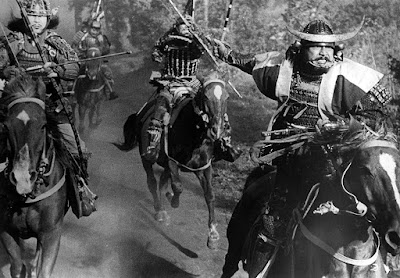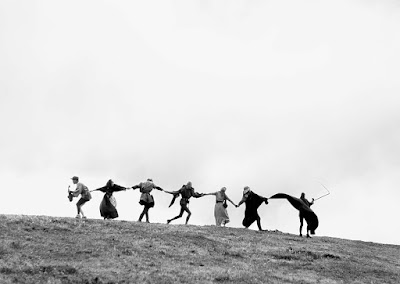Movie:
"Ben-Hur"
Year Nominated: 1960
Director: William Wyler
Rating: R
Running Time: 3 hours, 32 minutes
Did It Win?: Yes.
After Judah Ben-Hur (Charlton Heston) is imprisoned for a crime he did not commit by his childhood friend Messala (Stephen Boyd), he swears that one day he will break free and get his revenge.
Directed by William Wyler, "Ben-Hur" is a dramatic epic that takes place around the time of the biblical Jesus Christ and his subsequent crucifixion. Charlton Heston plays the titular Judah Ben-Hur, an wealthy Jewish prince who gets betrayed by his childhood friend Messala, played by Stephen Boyd, a Roman Tribune who convicts Ben-Hur of a crime he didn't commit without even the courtesy of a trial. Messala also imprisons Ben-Hur's sister Tirzah, played by Cathy O'Donnell, and mother Miriam, played by Martha Scott, in a dark, dank cell. This film tells of Judah's quest for revenge, through his time as a slave on a Roman galley to his days as a champion chariot racer. His story runs parallel to the story of Christ, who plays a minor character throughout the film, and the entire notion of faith plays a prominent role within the context of this story.
"Ben-Hur" is considered a classic by many in the cinephile community and it's easy to see why this might be the case. It won 11 of the 12 Academy Awards it was nominated for, and it jointly holds the record for most Oscar wins by any single picture. It was the sole record holder for 38 years before being tied by "Titanic," and later,
"The Lord of the Rings: Return of the King." We can't deny this is a technically well made film. It boasts some striking cinematography, beautiful art direction, sets, and costumes, as well as a few spectacular, epic, and intense memorable moments that have gone down in cinematic history as some of the best ever created. The most impressive of these moments is, of course, the now iconic chariot race. This is an amazing, fantastic scene full of never-been-done-before excitement that is sure to keep you fully engaged and glued to the screen as it plays out in spectacular fashion. In fact, there are many memorable moments in the early parts of "Ben-Hur." The entire opening hour is quite engaging, setting the stage for things to come later in the film.
Unfortunately, we can't in all honest say the same thing for the entire movie. At 3 hours and 32 minutes, needless to say, this is quite a long movie. We have never been people that mind longer films so long as they are appropriately paced and don't feel like they are drowning out the point of the story with frivolous scenes that don't fit or are too extra to matter. "Gone With the Wind" is the perfect example of a long film that doesn't feel long. Clocking in at 3 hours and 58 minutes, when all is said and done, it's a movie that feels like a drop in the bucket compared to "Ben-Hur." Even
"Lawrence of Arabia" felt more engaging as a whole, and it's 3 hours and 48 minutes long and includes many, many unnecessary but gorgeous long shots of desert walking. While watching "Ben-Hur," we couldn't help but feel it didn't really need to be as long as it is. There are many scenes which feel superfluous to the flow of the film. In these scenes, we found ourselves not engaged with the story and/or the characters, but rather, engaged with the clock. Instead of wondering if Ben-Hur would get his ultimate revenge and keep his faith through the course of the pain and horrors he had to endure during the story, we found ourselves wondering how long the filmmakers were going to drag this or that scene out, sometimes much longer than necessary. We know, we know, blasphemy! How dare we criticize "Ben-Hur"! In our honest opinion, this film isn't nearly as gripping as it was promised to be. Maybe this is a case of decades worth of build-up, only to meet initial disappointment, and maybe one day (decades in the future) we will watch it again, but as of right now, we can't help but be a little underwhelmed. The production itself is not underwhelming in the slightest, and in fact, is quite a lesson in Hollywood largess, but the story, and the length, and even some of the acting, feels uneven.
We have heard throughout the years that "Ben-Hur" is the greatest film of all time. When you hear such a bold statement like this, you expect to be completely taken in by it emotionally, and maybe even physically when it comes to being moved. Unfortunately, this didn't happen for us. Everything after the amazing chariot race, it seems to slog by and feels a bit redundant to the point of it all. Even after Jesus is crucified, the film
still goes on and on. This isn't a movie we would feel compelled to watch over and over again, though we will most likely give it a try at some later point to see if we've changed our minds. Of course, we would watch the chariot scene again right now given the opportunity. Like we said in our "Lawrence of Arabia" movie review, don't hate us.
My Rating: 7.5/10
BigJ's Rating: 7.5/10
IMDB's Rating: 8.1/10
Rotten Tomatoes Rating: 88%
Do we recommend this movie: Yes!
~~~~~~~~~~
One year ago, we were watching:
"The Tale of Princess Kaguya"






















